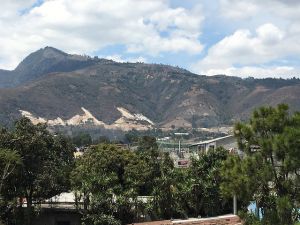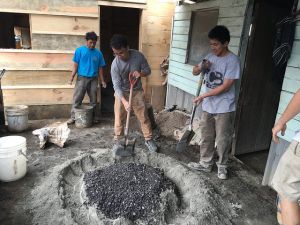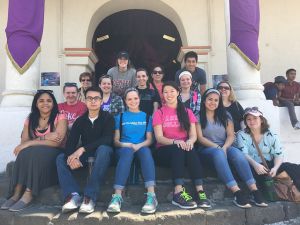
Cabrini’s study abroad program over spring break gives students firsthand experience of Guatemalan life through educating them on Guatemalan history, culture immersion and the opportunity to live as the indigenous people of Guatemalan.
Diego Ramirez, a junior international business major, has family in Guatemala and has been to the country before. He was happy to go back in the spring of 2016 to see his family and visit a different region of Guatemala.
“It’s awesome to actually go experience it,” Ramirez said. “[To] see all the things that you learn in the books, in the videos and you’re actually standing there.”
To attend the trip students must enroll in working for justice in Guatemala, which is a one-semester, blended ECG 200 and 300 course where they are educated on the history and conditions in Guatemala.
The course, instructed by both Dr. Jerry Zurek, communication professor, and Dr. Raquel Green, assistant professor of romance languages, was created after the first trip to Guatemala beccause the professors felt the students did not have enough history and knowledge to truly understand the experience.
“We have been doing this course since Jan. of 2009,” Green said. “We did the immersion then realized the students were not prepared.”
According to Green, students learn the history of Guatemala from colonial times to present day, focusing on their 30-year Civil War and integral human development.
“They are able to see that these communities, even though they still are challenged by poverty and lack of equity and education and job opportunities, they still have assets,” Green said.

This year, the week-long trip costs $1,000, but that does not discourage students from pursuing the experience.
Emely Gutierrez, a junior psychology major with a minor in Spanish, attended the Guatemala study abroad trip in the spring of 2016.
“I think that it was something that really changed me and I learned a lot from the people of Guatemala,” Gutierrez said.
According to Cabrini’s website, during the trip the students “Learn from community leaders about a wide variety of projects (fair-trade coffee production, home construction, sustainable farming, road improvements, etc.), work alongside community members, and participate in many other rich cultural, religious, and educational opportunities.”
“Something that really stood out to me was when we went and made a cement floor in a guy’s house. Well, it was his future house. We were helping build his future house,” Ramirez said. “It was actually awesome to see that the guy who was going to get the house was doing the work as well. He was right next to us helping us out.”
According to the students, the surrounding scenery is breathtaking and they make time to reflect every night under the stars.
“We did reflection every night,” Ramirez said. “We would go on the roof of our hotel and it’s a beautiful scene because you have the lake right there, the mountains, the stars and we would reflect on what we did throughout the day.”
The students come back from Guatemala with a broader knowledge and a greater appreciation for what they have in their own homes.

“I think it definitely made me appreciate what I have here in the United States,” Ramirez said.
After the immersion, students prepare to lobby to Congress in Washington, D.C. to fight for the non-reduction of funding for poverty-focused development assistance to countries like Guatemala. The students lobby on a variety of topics such as immigration, women’s empowerment, and education.
“I think I have become more vocal about global issues in general,” Gutierrez said. “I am just so invested in understanding and helping other people understand how important it is that we help people from other countries.”
Reflecting on the whole experience, Gutierrez uses what she learned to advocate on issues such as immigration.
“Just knowing and having that background I think helps me every day with knowing I can advocate and I have a voice,” Gutierrez said. “I use it all to motivate me to keep going and pushing for what I believe it.”
“These are things you can learn in a textbook and you can understand them but when you actually confront the reality you understand them at a very different level,” Green said.
Green finds great joy in seeing her students months or years after the trip and they are still talking about their experiences in Guatemala.
“It is a privilege as an educator to not only be part of that but also to see that it has left a mark that will be with them always,” Green said.


